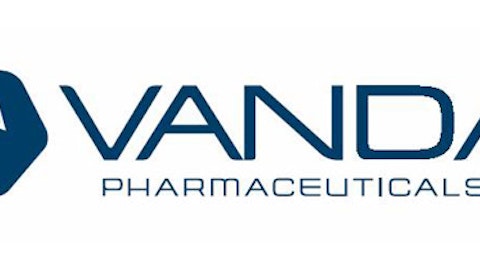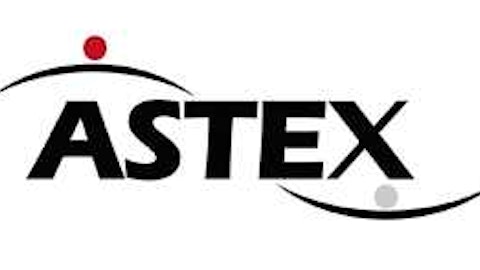Raptor Pharmaceutical Corp. (NASDAQ:RPTP) signed an agreement with HealthCare Royalty Partners. On the face, this deal looks good for shareholders injecting much needed capital into the company. However, this agreement might not in reality be as good as it initially appeared for shareholders.
Some specifics of the agreement point out red flags for shareholders. One specific red flag for shareholders is the interest rate on the loan.
“Under the terms of the agreement, Raptor Pharmaceutical Corp. (NASDAQ:RPTP) will receive $25 million (the “First Tranche Loan”) at closing and an additional $25 million (the “Second Tranche Loan”) upon U.S. Food and Drug Administration approval of PROCYSBI. The First Tranche and Second Tranche Loans, which mature on December 31, 2019, bear interest at an annual fixed rate of 10.75% and a Synthetic Royalty® variable rate, tiered down, based on a percentage of future PROCYSBI sales.The loan is interest-only for the first two years.”
The 10.75% interest rate is huge for Royalty Pharma. The key issue here is that the loan matures on December 31, 2019. By rather simple calculations, conservatively Raptor Pharmaceutical Corp. (NASDAQ:RPTP) will be paying over $21 million in interest over the life of the loan. The more important part is that the payments, even though they will be interest only for the first two years, will suck substantial cash flow out of the business. The royalty rate is an even further slap in the face for Raptor shareholders, usually marketing partners receive royalty rates and Royalty Pharma is not appearing to bring a great deal to the table…except for cash at a very high interest rate.
Specifically, Royalty Pharma brings money to the table that Raptor Pharmaceutical Corp. (NASDAQ:RPTP) will need if it is going to successfully market Procysi. While the royalty rate assigned to Royalty Pharma on sales of Procysbi is not clear, it takes further cash flow out of a company that will have to be paying a 10.75% interest rate. While the positive in terms of initial cash flow is the fact that the loan is interest-only for the first two years (which will help when Raptor is trying to shovel money into a sales force), the long-term value of this deal will hurt Raptor Pharmaceutical Corp. (NASDAQ:RPTP).
There are many different possible ways for a company to market a drug. One possibility is to license the drug to a larger partner, who will be responsible for the commercialization of the product. An example of this would be from Vanda Pharmaceuticals Inc.(NASDAQ:VNDA), with Vanda’s drug Probuphine. While Novartis AG (ADR) (NYSE:NVS) has had problems with having the drug meet market expectations, Vanda did not suffer a large amount of the financial fall of not having a drug sell. In this agreement, as is typical, the company that is licensing will receive a royalty on sales of the drug. While Vanda Pharmaceuticals Inc.(NASDAQ:VNDA) has a very promising pipeline, its drug Probuphine was not able to hit the sales targets that were projected when the drug hit the market.
Another way of possibly commercializing a drug is ‘going alone’ or without the help of a marketing partner. An example of this would be Corcept Therapeutics Incorporated (NASDAQ:CORT) and their orphan drug Korlym. Corcept has a few more compounds in its pipeline which should help to drive share growth in the long term along with Korlym. An interesting tidbit comes with the idea of how Corcept Therapeutics Incorporated (NASDAQ:CORT) is able to price Korlym due to the fact that it is an orphan drug.
In terms of long-term shareholder value, given the idea that Raptor Pharmaceutical Corp. (NASDAQ:RPTP) will be paying over $21 million in interest, only time will tell if Raptor’s move was a good or bad move. One important idea is whether or not they create shareholder value. If the drug meets sales projections, and is as profitable as the company says; then this deal actually looks decent for shareholders. Instead of diluting (which would likely have been the other solution available for Raptor absent a licensing deal), they have taken on debt. While no shareholder likes to see more debt than necessary the amount of debt might not be as concerning as millions of additional shares being issued.
Alexander Maxwel has no position in any stocks mentioned. The Motley Fool has no position in any of the stocks mentioned. Alexander is a member of The Motley Fool Blog Network — entries represent the personal opinion of the blogger and are not formally edited.
The article Assessing Raptor Pharmaceutical’s Agreement With HealthCare Royalty Partners originally appeared on Fool.com and is written by Alexander Maxwel.
Copyright © 1995 – 2013 The Motley Fool, LLC. All rights reserved. The Motley Fool has a disclosure policy.



